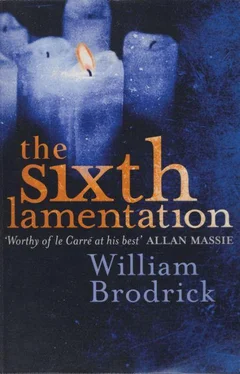William Brodrick - The Sixth Lamentation
Здесь есть возможность читать онлайн «William Brodrick - The Sixth Lamentation» весь текст электронной книги совершенно бесплатно (целиком полную версию без сокращений). В некоторых случаях можно слушать аудио, скачать через торрент в формате fb2 и присутствует краткое содержание. Жанр: Триллер, на английском языке. Описание произведения, (предисловие) а так же отзывы посетителей доступны на портале библиотеки ЛибКат.
- Название:The Sixth Lamentation
- Автор:
- Жанр:
- Год:неизвестен
- ISBN:нет данных
- Рейтинг книги:5 / 5. Голосов: 1
-
Избранное:Добавить в избранное
- Отзывы:
-
Ваша оценка:
- 100
- 1
- 2
- 3
- 4
- 5
The Sixth Lamentation: краткое содержание, описание и аннотация
Предлагаем к чтению аннотацию, описание, краткое содержание или предисловие (зависит от того, что написал сам автор книги «The Sixth Lamentation»). Если вы не нашли необходимую информацию о книге — напишите в комментариях, мы постараемся отыскать её.
The Sixth Lamentation — читать онлайн бесплатно полную книгу (весь текст) целиком
Ниже представлен текст книги, разбитый по страницам. Система сохранения места последней прочитанной страницы, позволяет с удобством читать онлайн бесплатно книгу «The Sixth Lamentation», без необходимости каждый раз заново искать на чём Вы остановились. Поставьте закладку, и сможете в любой момент перейти на страницу, на которой закончили чтение.
Интервал:
Закладка:
Later, when Lucy’s relationship with her father became more complicated, her mother. passed on a little more history so that Lucy might better understand the man she had ceased to know in a simple way
‘Try to understand your father,’ Susan said appealingly. ‘It wasn’t easy for him as a child, even though Grandpa did his best.’
Grandpa Arthur, she said, had tried to provide some consistency for Freddie and Elodie, giving them what he thought was a warm English upbringing, with lots of Gilbert and Sullivan, Wisden annuals (which Elodie loved) and regular tea at four o’clock. But he could not completely protect them. Where Agnes had been approachable and inviting one day, Freddie in particular would run towards her the next only to find her withdrawn. There had been one little incident that Freddie had never forgotten:
‘Mum, look what Alex gave me. It’s Excalibur. The sword pulled from a stone.’
Freddie held out the plastic brand with both hands, holding tight, just in case anyone actually tried to take it. Agnes slowed for a moment, but carried on peeling carrots.
‘Mum, look, it’s Excalibur. Alex gave it to me.’
Agnes continued roughly peeling off the skins, aware that Freddie was at her side, unaware he held out the toy he no longer wanted.
And Susan continued: ‘You see, it wasn’t easy for your father. It wasn’t that bad for Elodie.’
‘Why?’ Lucy asked, and was granted more history.
Part of the problem for Freddie was that Elodie did not need Agnes like he did.’ Ironically, that made relations between mother and daughter moderately relaxed. Elodie drew water from another well. She naturally gravitated towards her father, with their shared love of cricket, leaving Freddie behind, resentful. Batting averages held nothing for him and he vainly searched for something he could bring to his mother, but she gave no lead. So he found himself unable to reach his mother and jealous of his sister. When they grew up and left home, the distance between siblings was weakly bridged by Christmas cards and awkward phone calls, the most memorable of which was when Elodie rang to say she had cancer. Freddie didn’t know what to say and to his horror said nothing of consequence. He groped for the language they had once shared as children but that was long gone. He asked questions but could not remove the note of polite enquiry. He said goodbye as if nothing had really happened. The illness took its time, drawing Elodie down despite treatments, prescribed and otherwise. Curiously, as Freddie heard the details of decline he felt the need to talk to her. He rang spontaneously, often in the middle of the day, without knowing what he would say. More often than not conversation flowed easily, and something began to grow He paid a few visits, always arranging another. And then Elodie died, sedated and beyond the comfort of her family, aged thirty-two. He blamed himself for having become a stranger.’ And, somehow, Freddie blamed Agnes.
And Susan said to Lucy, ‘So you see, it hasn’t been that easy for your father.’
Lucy could remember her father still trying hard, despite his confusion. Grandpa Arthur had always said, proudly, that Agnes was a jolly good musician. So her father bought a piano. But Agnes never played it. He bought various records, but Agnes never listened to them. In that conventional period of family calm, after Sunday lunch, the piano and records became a silent accusation. The lid had not been lifted; the records were still wrapped in cellophane. It was Lucy who first pressed the keys and introduced ‘Chopsticks’ to the house. It was Lucy who scratched Faure’s ‘Romance sans parole’, anxious because of the simmering politesse among the grown-ups. The scratching was a symbolic mishap, because the second of those three little piano pieces was her grandmother’s favourite melody. That was why Freddie bought it.
It seemed to Lucy — not surprisingly — that her father’s attempts to reach his mother became more deliberate and dutiful, his need constrained by a thin skin of self-protection. And yet, simultaneously, as Agnes grew older her oscillations in mood were replaced by a more moderate inaccessibility. But by then it seemed to be too late for Freddie. He could not slough the skin. Lucy’s memory of Grandpa Arthur at this time was of a tired man, endlessly patient and exquisitely gentle with Agnes but a man who had learned to live more or less alone. He died quietly in his sleep one day, after a sudden stroke, as if he had slipped out of the back door in his slippers, unnoticed.
Agnes was strangely composed until the funeral, when her grief broke out like a flood. Then it sank away like a stone beneath flattened water. However, she refused to stay in the family home and sold up within two months, moving to a spacious flat in Hammersmith, by the river.
The loss of Grandpa Arthur left Freddie bereft. And Agnes, of all people, could not help him.’ The remaining links between them began to fragment, and Freddie’s anger at his mother began to break out. He snapped at her more frequently, his outbursts becoming less of a protest and more of an accusation: for being his reluctant mother.
2
Even as Lucy received and experienced the living history of her family she understood that her father’s problems had juddered wholesale into Susan, and embrangled her own most formative years.
What should have been a playground for a child had turned out to be more of a No Man’s Land, strewn with adult debris. As she’d tried to romp around she’d snagged herself on unseen obstacles, until she’d learned by experience to locate and map out the specific danger spots between all her relations. By the age of fifteen Lucy had acquired the ability to move among her family with the supreme ease of a sophisticated adult. She became the deft one, prodding people away from plotted minefields. She seemed wise.
It was this shining characteristic that led her father to speak so unguardedly, and her mother to say more by way of further explanation. They didn’t mean any harm, but they said enough to take, inadvertently, the glow off Lucy’s innocence. Only Agnes and Grandpa Arthur left her alone.
So, it was not surprising that, after Grandpa Arthur died, Agnes and Lucy were imperceptibly drawn to one another, without effort, decision or the swapping of inner wounds. They grew to enjoy each other’s company, neither of them placing demands upon the other. There was no weighted expectation. Long periods of silence could be shared, punctuated by clipped, comfortable conversation. It was obvious to anyone else in the same room that there was an alliance of sorts between them. But this only triggered a jealousy within her father that he could not bring himself to acknowledge, but could not stop himself from expressing, even when something far more serious was at stake.’ As he did when Lucy announced she was leaving home to live with a man:
‘A man?’
‘Yes.”
‘Could you be more specific?’
‘Tallish…’
‘Don’t be cheeky to your father,’ said her mother, flushed.
‘Have I met him?’ he pursued. ‘No. But Gran has.’
‘Gran has?’ said her father, incredulous, and lowered his head.
‘Only once, Freddie, by accident,’ said Agnes apologetically from her chair by the fire.
‘He’s called Darren and he’s thirty-seven.’
‘But you’re only twenty,’ Susan said, pale and desperate, smoothing her blouse. ‘Darren, you say?’
Her father collected his coat and left the room, saying, ‘Lucy, I’m going home. You can tell me as much as you see fit when you feel like it. Or maybe Gran can tell me next Sunday.’
He apologised profusely that evening for his petulance, by which time he’d got to grips with the anxiety that really troubled him. At the time of her announcement Lucy had recently dropped out of Cambridge, after winning a scholarship at King’s to read Economics. It had been more of a triumph for Freddie than for her — she had made it to the same college to read the same subject as he had done. It was just marvellous… even though Lucy’s interest lay in literature, not the science of wealth distribution. When Lucy left university at the end of her first year, her father entered a sort of mourning. So did Lucy; she wore black and dyed her hair. For a short while she attacked the structure of Capital by drawing Income Support. Her father spoke to his old college? the place was open for the next academic year. But she found a job as a finance clerk for a small company that manufactured pine chairs. Pine chairs? Freddie cried. Yes, and a few tables. Oh my God, he said. Her mother bought a rocker. And then, at a party, Lucy met Darren, who had a lively interest in Lenin. He was the only person she knew who’d read the lambent phrases of Joseph Schumpeter. He introduced her to the vast, liberating plain of Other People’s Misery but he quarried his authority from Lucy’s lack of self-esteem. Age and force of manner overwhelmed her innate, cultured sophistication and she became a disciple. The large house called Home fell under the heavy sword of ideological scrutiny. She moved out. There was little Freddie could say. Her mother cried and cried.
Читать дальшеИнтервал:
Закладка:
Похожие книги на «The Sixth Lamentation»
Представляем Вашему вниманию похожие книги на «The Sixth Lamentation» списком для выбора. Мы отобрали схожую по названию и смыслу литературу в надежде предоставить читателям больше вариантов отыскать новые, интересные, ещё непрочитанные произведения.
Обсуждение, отзывы о книге «The Sixth Lamentation» и просто собственные мнения читателей. Оставьте ваши комментарии, напишите, что Вы думаете о произведении, его смысле или главных героях. Укажите что конкретно понравилось, а что нет, и почему Вы так считаете.












